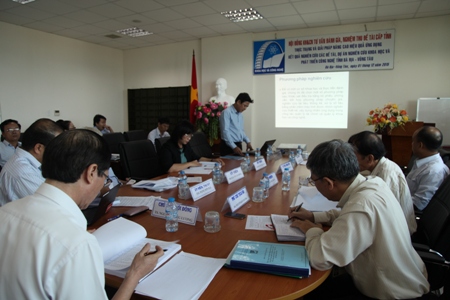
On December 1st, the Department of Science
and Technology held a meeting to review the province level research "The
situation and solutions to improve the efficiency of applications of province
level researches and technological advances of Ba Ria – Vung Tau province in
the period of 2001-2012", lead by Dr. Pham Ngoc Vu (Department of Science
and Technology) and Dr. Tran Tinh Huy.
The research surveyed
151 province level researches and projects which were implemented in the
2001-2012 period. Researches and projects’ fields expanded from natural
sciences, engineering and technology, agricultural sciences, health and
pharmaceutical sciences, Social Sciences and Humanities. The research aimed to assess the impact of
applying researches and projects implemented in 2001-2012 that were accepted
and applied in practice and to propose solutions to help the applications of
researches results into practice.
According to the
researchers, during this period, there were 151 projects were carried,
including 22 researches in projects in natural sciences (14.57 % of the total),
35 researches and project in engineering and technology (23.18% of the total),
47 in agricultural sciences (31.13% of the total, the highest in all fields), 14 in health and pharmaceutical sciences (9.27%
of the total), 29 in Social Sciences (19.21% of the toil), 4 in Humanities (2.65%
of the total).
Provincial level researches
and pilot projects were reviewed and graded by scientific committees organized
by the department to be completed. Out of the total 135 projects completed (as
of October 2014), 100% of the projects was graded from average upwards, 17
projects achieved excellent grade, accounting for 12.59 %, 102 projects
achieved good grade, accounting for 75.56 %. The remaining 16 projects were
graded medium, accounting for 11.85 % of the total.
Comparing between project
types, pilot production project type had the highest proportion of projects
graded excellence as 19,23% (5 out of 26 projects), followed by applied
researches with 12.31 % of the total were graded excellence (8 out of 65 projects).
The remaining were researches in basic sciences with 9.09% graded excellence (4
out of 44 researches).
Comparing between project
fields, engineering and technology had the best achievements in term of
percentage of projects graded excellence (20% with 7 out of total 35 researches
and projects), followed by agricultural science (14.29 % with 5 out of total 35
researches and projects). The remaining excellence researches projects were natural
science topic (3/22 projects), medical and pharmaceutical topic (1/13 projects)
and social science topic (1/27 projects). In the field of human science, during
this period there were only 03 researches completed out of 04 researches
implemented in which 01 research graded as good and 02 researches graded as
average and no research achieved excellence graded.
The research team
proposed several solutions for the efficient application of these researches
and pilot projects into practice. First of all, detail instructions about
researches implementation rules need to be given by the province, including
regulations in funding mechanisms, choosing research topics, evaluating
research proposals and choosing research team schemes and project management
mechanisms. Secondly, science and technology organizations of the province need
to be invested both in term of finance and qualified human resources to ensure
the successful application of researches results into practice and the
successful connection with researches centers, universities and institutes in
the country.
Thirdly, the careful selection
of quality researches and pilot projects to be applied into practice need to be
given priority because these projects can have large impacts on the social and
economic development of communities. Fourthly, the role of other provincial
departments is of critical importance and departments should suggest research
areas and topics that can be applied to their fields. Fifthly, there needs to
be more policies to encourage enterprises to participate in research and
development activities and applying research result into the practices of their
businesses. Last but not least, the implementation of the province’s online
technology exchange needs to be speeded up to function as a flat form to
exchange information on technological demand and supply and scientific
researches, not only in the provincial market but also at the national and
international markets.
The reviewing committee highly evaluated the research, agreed on the completion of the study and graded it as good.

 Previous page
Previous page Back to top
Back to top







